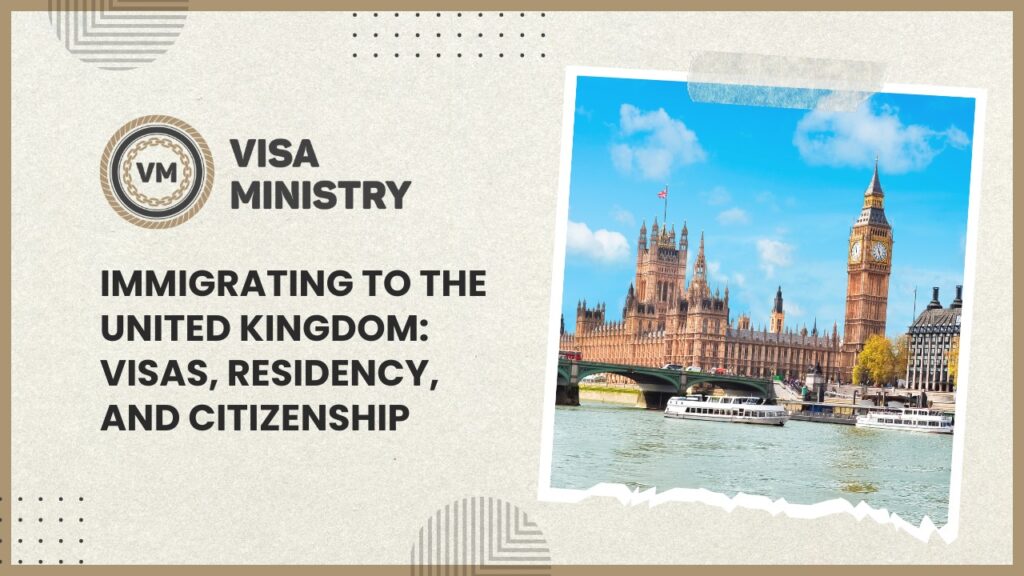Welcome to the land of tea, crumpets, and iconic red telephone booths – the United Kingdom! Whether you’re drawn in by its rich history, world-class education system, or bustling city life, immigrating to the UK can be an exciting adventure. But before you pack your bags and hop on a plane, it’s important to understand the ins and outs of the country’s immigration system. From visas to residency requirements and even citizenship opportunities, this blog post will guide you through everything you need to know about making the UK your new home. So let’s dive into this comprehensive guide on immigrating to the United Kingdom!
The United Kingdom’s Points-Based Immigration System
The United Kingdom’s Points-Based Immigration System is a key factor to consider when planning your move. Introduced in 2021, this system aims to attract highly skilled individuals who can contribute to the country’s economy and fill specific labor shortages. It operates on a points-based system where applicants are assessed against various criteria such as age, English language proficiency, job offers, and qualifications.
To be eligible for a visa under the new system, you must accumulate enough points based on these factors. The higher the demand for your skills or expertise, the more likely you are to meet the required threshold. This means that certain occupations may have lower requirements while others may require additional qualifications or experience.
One of the main advantages of this system is its flexibility. It allows individuals with diverse backgrounds and skill sets to apply for different types of visas tailored to their needs. Whether you’re an entrepreneur looking to start a business in the UK, a skilled worker seeking employment opportunities, or even someone with exceptional talent in arts and culture – there’s likely a visa category that suits your circumstances.
However, it’s important to note that meeting the minimum point requirement does not guarantee success in obtaining a visa. The UK government also considers other factors such as criminal records or previous immigration violations before granting permission.
Navigating through this complex process can seem daunting at first but seeking professional advice from immigration experts can greatly increase your chances of success. Understanding how each aspect of the Points-Based Immigration System works will help ensure that you submit a strong application aligned with all necessary requirements.
The Different Types of UK Visas
When it comes to immigrating to the United Kingdom, understanding the different types of visas available is crucial. Each visa category has its own set of requirements and restrictions, so it’s important to choose the one that best fits your situation.
One common type of visa is the Tier 2 General Visa, which allows skilled workers with a job offer from a UK employer to live and work in the country. This visa requires sponsorship from an employer who holds a valid sponsor license.
If you are planning to study in the UK, you will need a Tier 4 Student Visa. This visa is for individuals enrolled in full-time courses at accredited educational institutions. It allows you to stay in the country for the duration of your studies and even work part-time during term time or full-time during vacation periods.
For entrepreneurs looking to start or invest in a business in the UK, there is the Tier 1 Entrepreneur Visa. To qualify for this visa, applicants must have access to at least £50,000 in investment funds and meet other eligibility criteria.
Another option is the Ancestry Visa, which is available for individuals with a grandparent born in the UK. This visa allows holders to work and live freely without any restrictions on employment or self-employment opportunities.
There are also visas specifically designed for family members joining their loved ones who already reside legally in the UK. These include Spouse Visas, Fiancé(e) Visas, and Parental Visas among others.
It’s important to note that each type of visa has its own specific requirements regarding financial capacity, English language proficiency,and proof of intent not overstay after its expiration date.
By familiarizing yourself with these different types of visas,the process will become less daunting as you navigate through your immigration journey into one great nation called The United Kingdom!
How to Apply for a UK Visa
Applying for a UK visa can seem like a daunting process, but with the right information and guidance, it can be manageable. Here’s a step-by-step guide on how to apply for a UK visa.
Determine which type of visa is appropriate for your situation. The United Kingdom offers various types of visas, such as work visas, student visas, family visas, and tourist visas. Each has its own specific requirements and eligibility criteria.
Next, gather all the necessary documents needed for your application. This may include proof of identity, financial statements to demonstrate your ability to support yourself in the UK, employment or education records if applicable.
Once you have all your documents ready, fill out the online application form accurately and completely. Double-check all the information before submitting it.
Pay the required visa fee either online or at a designated payment center. Keep in mind that fees vary depending on the type of visa you are applying for.
After submitting your application and paying the fee, schedule an appointment at a Visa Application Center (VAC) to provide biometric data including fingerprints and photograph.
Attend your appointment at the VAC on time with all relevant documents supporting your application. It is essential to bring originals as well as copies of these documents.
Finally, wait for the decision on your visa application. The processing time may vary depending on the type of visa and other factors.
Following these steps will make the UK visa application process smoother and easier to manage.
UK Residency and Citizenship
Once you have successfully obtained a visa to live and work in the United Kingdom, you may be interested in pursuing residency or even citizenship. UK residency allows individuals to live in the country on a more permanent basis, while UK citizenship grants them all the rights and privileges of being a British citizen.
To become a resident in the UK, you will need to meet certain requirements. This typically includes living continuously in the country for a specified period of time, usually five years. During this time, it is important to maintain your immigration status by abiding by all laws and regulations.
After obtaining residency, you may also consider applying for British citizenship. This process involves meeting additional criteria such as passing an English language test and demonstrating knowledge about life in the UK through a Life in the UK Test.
It’s worth noting that becoming a citizen has many benefits including access to healthcare services, voting rights, and eligibility for public office positions. Additionally, as a citizen of the United Kingdom, you can freely travel within other European Union countries.
Whether you choose to pursue residency or aim for full citizenship depends on your personal circumstances and aspirations. However, both options offer incredible opportunities for those looking to call the United Kingdom their home.
Remember that each individual case is unique when it comes to immigration matters; therefore seeking professional advice from an immigration lawyer or consultant is always recommended before making any decisions regarding residency or citizenship applications.
Conclusion
In this blog post, we have explored the various aspects of immigrating to the United Kingdom – from understanding the points-based immigration system to the different types of UK visas available. We have also discussed how to apply for a UK visa and provided insights into UK residency and citizenship.
The United Kingdom has long been an attractive destination for individuals seeking new opportunities and experiences. With its rich history, vibrant culture, and diverse economy, it offers a wealth of possibilities for those looking to build a new life in a foreign land.
Navigating the immigration process can be complex, but armed with knowledge about the different visa options and requirements, you can take confident steps towards your goal of immigrating to the United Kingdom. Whether you are applying for a work visa, student visa or family-related visa, it is important to understand and fulfill all necessary criteria.
Remember that each type of visa has specific conditions and limitations. It’s crucial to stay informed about any changes in immigration policies or regulations as they may impact your application process.
Obtaining UK residency status opens up even more opportunities for immigrants who wish to establish deeper roots in their adopted country. This allows access to benefits like healthcare services, education facilities and employment opportunities on par with British citizens.
For those aiming for full integration into British society, becoming a citizen provides rights such as voting in elections and holding a British passport. The path towards citizenship involves meeting certain eligibility requirements including residing in the country for several years.
As you embark on your journey towards immersing yourself into life in the United Kingdom, be sure to seek professional guidance when needed. Immigration solicitors or advisors are well-versed in navigating these processes effectively while ensuring compliance with all legal obligations.
So whether you dream of working at renowned institutions like Oxford University or starting your own business venture amidst London’s bustling streets – take that first step towards making your dreams come true by exploring the myriad opportunities offered by immigrating to the United Kingdom.
Remember, perseverance and a clear understanding of the immigration process will help make your journey smoother and more enjoyable!

